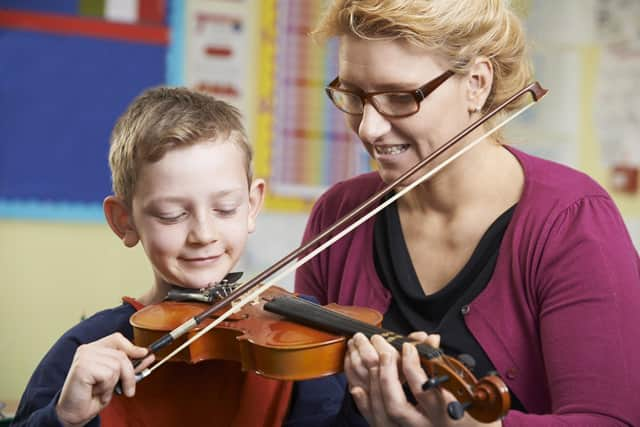Record number of Scottish school pupils learning musical instrument after SNP axed fees
Demand for music tuition among school pupils in Scotland has surged to record levels, leaving long waiting lists in parts of the country.
The SNP’s decision to scrap charges for learning a musical instrument in 2021 has been credited as a “big catalyst” for the rise, with campaigners urging the Government to protect the funding ahead of Tuesday’s Budget.
Advertisement
Hide AdAdvertisement
Hide AdThe newly-published Instrumental Music Services (IMS) survey for 2022/23 shows how pupil numbers have “rebounded very strongly after the dip during the pandemic”.


A total of 61,715 pupils took part in lessons in the past year, which is 8.9 per cent of the school roll and the highest number since the IMS survey was first carried out more than a decade ago. However, there were wide variations, ranging from 3 per cent of pupils in North Lanarkshire to 30 per cent in the Western Isles.
Waiting lists were operating in 27 of the 32 council areas, due to the limited number of instructors, and capacity issues in some buildings. Demand was significantly outstripping supply in some areas, including Dumfries and Galloway, where the council had 787 pupils on its waiting list, and in Angus, where there were 260.
In South Ayrshire, the number of interested pupils was three times the number participating, while Renfrewshire Council could accommodate one third of those who were interested.
There were 625 full-time equivalent instructors last year, which was up slightly on the past few years, but remains below the level between 2013 and 2018.
John Wallace, former principal of the Royal Conservatoire of Scotland, described the rise in pupil numbers as “incredibly good news”.
He said if those involved in the Scottish Government’s Youth Music Initiative were included, more than 250,000 young Scots were getting an introduction to music.
"Scotland is really becoming a music nation,” he told The Scotsman. “There is just a bottomless appetite for music amongst kids at the moment.
Advertisement
Hide AdAdvertisement
Hide Ad"With something like 798,000 school children in Scotland, you’ve got to get to a lot of them. But at the moment, we’re getting to 30-40 per cent of them, which is sensational compared to other countries.”
Before the Government and councils agreed to scrap charges, some local authorities were billing parents up to £300 a year.
Mr Wallace said: "I think that was about the single biggest barrier to access that there was. I think the removal of fees has been a big catalyst to this.”
He also highlighted the role of music in TV programmes such as Strictly Come Dancing, as well as on social media websites like TikTok.
Alastair Orr, a brass teacher and long-time campaigner for instrumental and vocal education in schools, welcomed the IMS report.
“The record number of children learning to play an instrument or to sing is a clear vindication of the ten-year campaign to secure free instrumental and vocal tuition in Scotland's schools,” he said.
"There remains much work to be done to tackle waiting lists in many local authorities. This can only be achieved by employing more instrumental and vocal teachers across the country.”
A Scottish Government spokesperson said: “It's welcome news that the number of pupils signing up for music tuition is at a record high. This is thanks to direct investment from the Scottish Government - in 2023-24 we have provided £12 million of funding to ensure that music tuition remains free.
Advertisement
Hide AdAdvertisement
Hide Ad"Music plays a vitally important role in young people’s lives, and beyond developing their wider skills and learning we know these kinds of activities also have a huge positive impact on their confidence and wellbeing. The Cabinet Secretary will raise the matter of waiting lists with COSLA when she next meets with them, recognising that would be a matter for individual local authorities to respond to."
Comments
Want to join the conversation? Please or to comment on this article.
